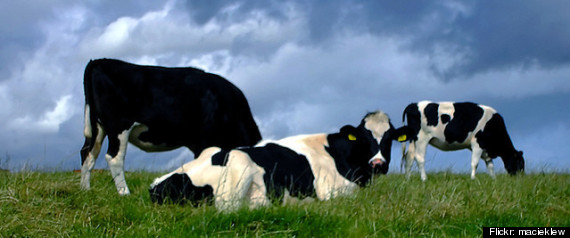
BY THE HUFFINGTON POST
“As part of our targeted surveillance system, the U.S. Department of Agriculture’s (USDA) Animal and Plant Health Inspection Service (APHIS) has confirmed the nation’s fourth case of bovine spongiform encephalopathy (BSE) in a dairy cow from central California. The carcass of the animal is being held under State authority at a rendering facility in California and will be destroyed. It was never presented for slaughter for human consumption, so at no time presented a risk to the food supply or human health. Additionally, milk does not transmit BSE.
“The United States has had longstanding interlocking safeguards to protect human and animal health against BSE. For public health, these measures include the USDA ban on specified risk materials, or SRMs, from the food supply. SRMs are parts of the animal that are most likely to contain the BSE agent if it is present in an animal. USDA also bans all nonambulatory (sometimes called “downer”) cattle from entering the human food chain. For animal health, the Food and Drug Administration (FDA) ban on ruminant material in cattle feed prevents the spread of the disease in the cattle herd.
“Evidence shows that our systems and safeguards to prevent BSE are working, as are similar actions taken by countries around the world. In 2011, there were only 29 worldwide cases of BSE, a dramatic decline and 99% reduction since the peak in 1992 of 37,311 cases. This is directly attributable to the impact and effectiveness of feed bans as a primary control measure for the disease.
“Samples from the animal in question were tested at USDA’s National Veterinary Services Laboratories in Ames, Iowa. Confirmatory results using immunohistochemistry and western blot tests confirmed the animal was positive for atypical BSE, a very rare form of the disease not generally associated with an animal consuming infected feed.
“We are sharing our laboratory results with international animal health reference laboratories in Canada and England, which have official World Animal Health (OIE) reference labs. These labs have extensive experience diagnosing atypical BSE and will review our confirmation of this form of the disease. In addition, we will be conducting a comprehensive epidemiological investigation in conjunction with California animal and public health officials and the FDA.
“BSE is a progressive neurological disease among cattle that is always fatal. It belongs to a family of diseases known as transmissible spongiform encephalopathies. Affected animals may display nervousness or aggression, abnormal posture, difficulty in coordination and rising, decreased milk production, or loss of body weight despite continued appetite.
“This detection in no way affects the United States’ BSE status as determined by the OIE. The United States has in place all of the elements of a system that OIE has determined ensures that beef and beef products are safe for human consumption: a mammalian feed ban, removal of specified risk materials, and vigorous surveillance. Consequently, this detection should not affect U.S. trade.
“USDA remains confident in the health of the national herd and the safety of beef and dairy products. As the epidemiological investigation progresses, USDA will continue to communicate findings in a timely and transparent manner.”







